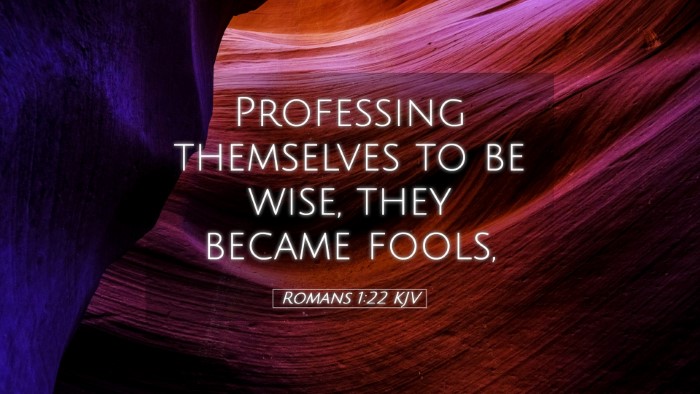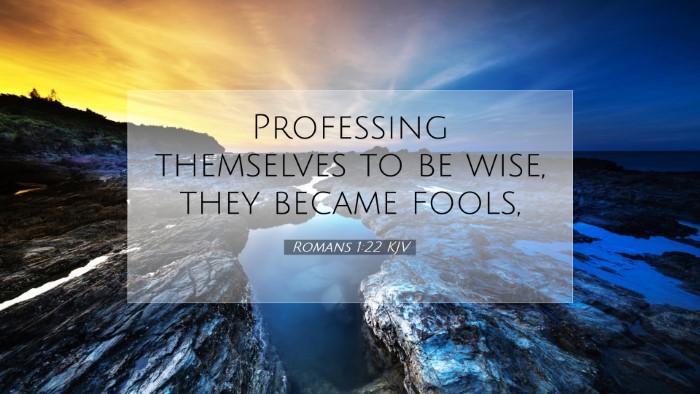Commentary on Romans 1:22
Scriptural Text: "Professing themselves to be wise, they became fools."
Introduction
This verse from Paul's epistle to the Romans serves as a profound reflection on the folly of human wisdom when detached from divine truth. Throughout Romans 1, the Apostle Paul underscores the consequences of rejecting the knowledge of God, which leads to a distorted understanding of reality. Here, we will draw insights from public domain commentaries by Matthew Henry, Albert Barnes, and Adam Clarke to explore the depth of meaning encapsulated in this verse.
Matthew Henry's Perspective
Matthew Henry remarks on the irony present in the words of Romans 1:22, pointing out that those who consider themselves wise in their ways often exhibit a profound ignorance of God. He elaborates that human wisdom, when devoid of the acknowledgment of divine authority, leads not to enlightenment but to foolishness.
Henry also emphasizes that this passage reflects a common theme in Scripture—the contrast between divine wisdom and human folly. The self-proclaimed wise often indulge in foolish speculations about creation and morality, failing to recognize that true wisdom stems from reverence for God.
- Self-Deception: Henry discusses how self-deception is a precarious state; those who believe they possess wisdom are often blind to their shortcomings.
- Moral Implications: The moral implications are severe, as such folly leads to debased minds and actions contrary to the divine order.
Albert Barnes' Insights
Albert Barnes provides a thorough analysis of the terms used in this verse, focusing on the idea of "professing" and the persona of the wise. He states that the intention of Paul was to portray a poignant critique of the philosophers and intellectual elites of his time, who pride themselves on their understanding of the world while neglecting the foundational truths of Scripture.
Barnes points out that the wisdom of man, when placed in opposition to the wisdom of God, ultimately reveals a lack of discernment. He explains that this professed wisdom leads to a false sense of security and a misunderstanding of life itself:
- Intellectual Pride: The elevation of human intellect over divine wisdom often results in arrogant dismissal of God's truth.
- Foolish Outcomes: The consequences of such pride are clear—moral and spiritual debasement, where wisdom leads individuals into deeper folly.
Adam Clarke's Commentary
Adam Clarke adds depth to our understanding by exploring the cultural context of this passage. He notes that the Roman society was characterized by a significant reliance on human philosophy and wisdom, often at the expense of divine revelation. Clarke asserts that this verse serves as a direct confrontation to the Roman intellectual tradition, suggesting that true wisdom is not found in human reasoning but in the fear of God.
Furthermore, Clarke emphasizes that this misguided wisdom, defined by hubris, leads to a rejection of God, showcasing a cycle of downward progression. He writes about the nature of foolishness in rejecting God’s truth, which highlights the theme of divine revelation versus human intellect:
- Cultural Context: Clarke provides insight into how prevailing cultural influences can lead individuals away from God's truth, echoing the sentiments of the passage.
- Reversal of Understanding: The notion that wisdom can turn to folly reveals a reversal of understanding that characterizes many individuals in their spiritual journeys.
Theological Implications
Collectively, the insights from Henry, Barnes, and Clarke converge to illustrate the profound theological implications contained within Romans 1:22. The verse serves not only as a warning against the vanity of human wisdom but also as a call to align oneself with the wisdom that comes from God.
The rejection of divine wisdom leads to chaos in moral and spiritual domains, emphasizing the importance of grounding one’s understanding in Scripture. The scholars encourage readers, particularly pastors and theologians, to recognize the importance of divine revelation in shaping true wisdom and understanding.
Conclusion
In conclusion, Romans 1:22 offers a significant reflection on the nature of human wisdom apart from divine wisdom. The insights drawn from Matthew Henry, Albert Barnes, and Adam Clarke collectively highlight the folly of relying solely on human reasoning. As believers, it is paramount to seek wisdom that is rooted in a relationship with God, ensuring that our understanding of the world aligns with the truth revealed in Scripture.
Ultimately, this verse challenges readers to embrace humility and recognize the limits of human intellect while pursuing the wisdom bestowed by the Creator.


